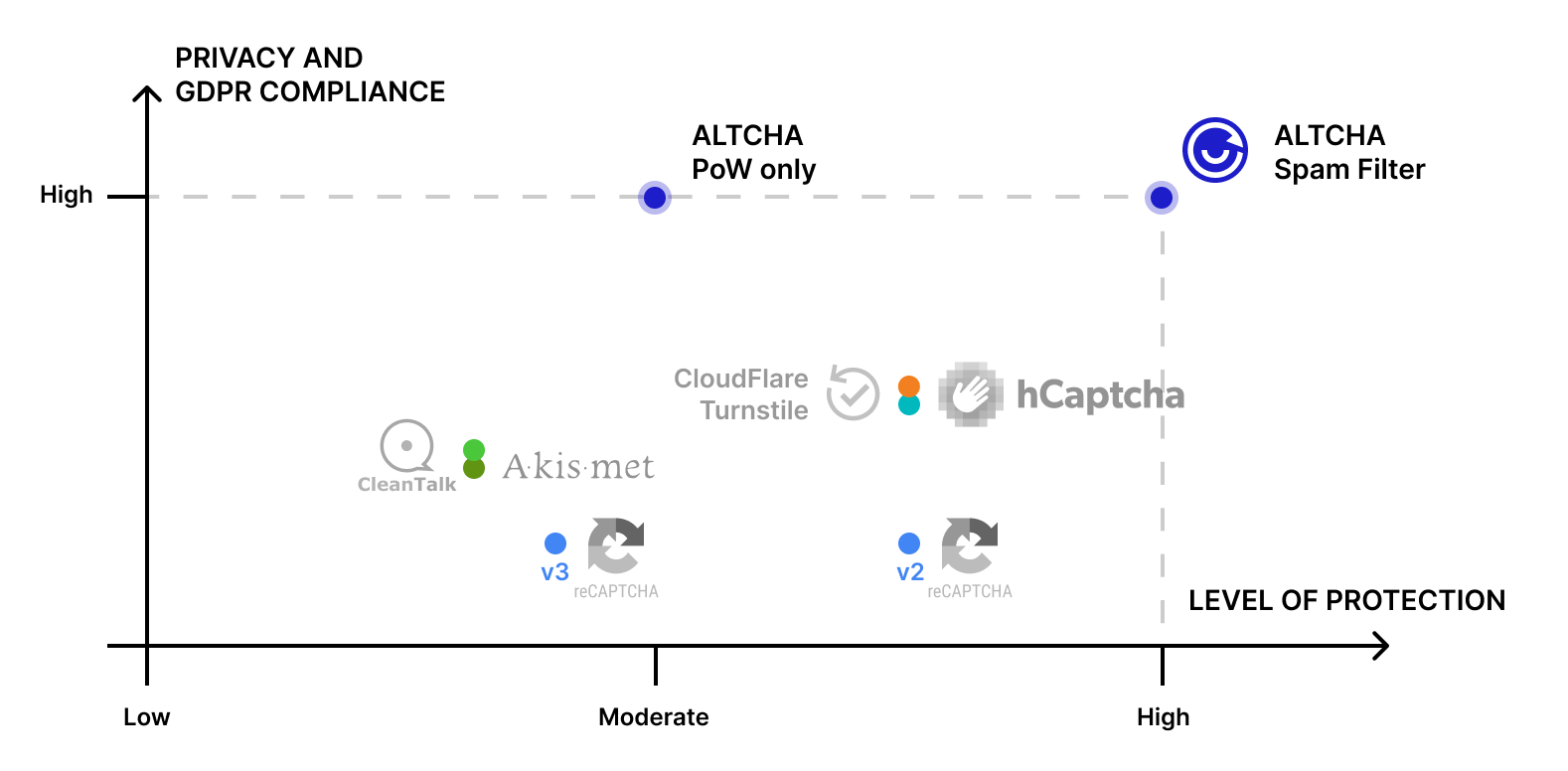ALTCHA's effectiveness
This document is tailored for a non-technical audience, such as website owners and product managers evaluating ALTCHA as a potential replacement for reCAPTCHA or similar solutions.
ALTCHA, an open-source protocol and JavaScript widget, aims to combat spam and abuse on websites and web applications. While it doesn’t claim to eradicate all internet spam, it offers a privacy-focused tool adaptable to evolving needs, especially when combined with the Spam Filter.
ALTCHA’s Approach
Understanding ALTCHA’s unique approach to tackling spam and abuse is crucial. Unlike traditional solutions, ALTCHA combines a Proof of Work (PoW) mechanism with advanced spam filtering to create a robust, privacy-focused defense against spammers and automated bots.
The Core Principle
ALTCHA diverges from traditional CAPTCHAs by adopting a different focus. Rather than solely aiming to differentiate humans from bots, ALTCHA’s primary goal is to reduce spam by introducing a layer of complexity. This complexity acts as a barrier for spammers and automated bots attempting to abuse systems.
Proof of Work (PoW)
- How It Works: ALTCHA leverages a mechanism known as Proof of Work (PoW) to authenticate and validate user interactions. PoW demands considerable computational effort from the user’s device to validate requests.
- Effectiveness: This requirement presents a significant hurdle for unsophisticated bots lacking the technical capabilities or resources to meet the computational demands.
The Power of the Spam Filter
The Spam Filter is a critical component that significantly enhances ALTCHA’s effectiveness. By incorporating advanced techniques like IP verification and blacklist checking, it adds a robust layer of protection against sophisticated bots and human-generated spam.
Advanced IP Verification
- IP Analysis: The GDPR-compliant Spam Filter analyzes incoming data to classify unsolicited messages. A critical aspect of this process is checking the IP address of the request.
- Data Center and TOR Detection: By detecting if an IP address originates from a data center or a TOR proxy, the Spam Filter can identify potential bots. IPs from these sources often indicate automated attempts to bypass security measures.
- Black List Checking: The Spam Filter also checks the IP addresses against known blacklists. This additional layer of security helps identify and block known malicious IPs, further enhancing protection.
- Increased Effectiveness: Using IP verification and blacklist checking, ALTCHA significantly boosts its effectiveness in filtering out malicious actors and enhancing overall protection.
Natural Language Processing and Machine Learning
- Content Analysis: The Spam Filter employs natural language processing and machine learning to evaluate the content of incoming messages, filtering out spam efficiently.
- Comprehensive Insights: In addition to IP analysis, it examines factors like the end-user’s email address to provide further insights into the legitimacy of the interaction.
Privacy and Compliance Considerations
Maintaining privacy and compliance is crucial in today’s digital landscape. ALTCHA is designed to meet stringent GDPR guidelines, ensuring that user data is protected while providing robust spam and abuse prevention.
GDPR and Privacy
- Compliance: ALTCHA conforms to GDPR guidelines, ensuring compliance and privacy adherence.
- Privacy-Centric: It operates as a cookie-less solution, respecting user privacy without relying on intrusive tracking mechanisms, aligning seamlessly with privacy regulations.
Embracing Automation
ALTCHA’s design embraces automation, enhancing user experience and reducing the friction commonly associated with traditional CAPTCHA solutions. This section explains how ALTCHA supports seamless user interactions and aligns with modern technological advancements.
User Experience
- Traditional vs. ALTCHA: Traditional CAPTCHAs are tedious and time-consuming, potentially leading to customer loss. ALTCHA, on the other hand, promotes automated systems’ integration and enhances user experience.
- Simplicity: By embracing automated systems, ALTCHA simplifies user interactions, leading to higher user satisfaction and smoother experiences.
Alignment with Future Technologies
- Automation Friendly: ALTCHA does not impede automation but accommodates it. By minimizing spam from unsophisticated bots, it aligns with the evolving landscape of technology.
Adaptability
ALTCHA is not a one-size-fits-all solution; its flexibility allows it to be tailored to various scenarios and security needs. This section covers how ALTCHA can be customized to provide versatile protection against spam and abuse.
Versatile Protection
- Comprehensive Measures: ALTCHA PoW effectively combats automated spam across various scenarios. For comprehensive protection against complex abuse or human-generated spam, integrating ALTCHA’s Spam Filter is crucial.
- Customizable: ALTCHA offers flexibility for server-side enhancements, allowing the integration of supplementary mechanisms like fingerprinting, email or phone verification, or server-based rate-limiting.
Comparison
To clearly illustrate the advantages of ALTCHA combined with the Spam Filter, this section provides a comparison table. It highlights the key features and benefits compared to other solutions like reCAPTCHA.
| Feature | ALTCHA + Spam Filter | reCAPTCHA | Other Solutions |
|---|---|---|---|
| Privacy Compliance | Fully GDPR-compliant | Partial | Varies |
| User Experience | High | Moderate | Low to Moderate |
| Automation Friendly | Yes | Limited | Varies |
| Spam Reduction | High | Moderate | Low to Moderate |
| Adaptability | High | Low | Varies |
The following chart illustrates how ALTCHA compares to other solutions in terms of protection level and privacy/GDPR compliance:

Conclusion
In essence, ALTCHA’s strength lies in its focus on complexity rather than solely distinguishing between humans and bots. Its implementation of PoW effectively deters unsophisticated bots, respects user privacy, aligns with evolving technologies, and offers adaptability to cater to different security requirements.
To further enhance its effectiveness against sophisticated bots and human-generated spam, consider combining the PoW mechanism with ALTCHA’s Spam Filter. This combination preserves accessibility and privacy while significantly bolstering protection, particularly through advanced IP verification, blacklist checking, and comprehensive content analysis.
Further reading: